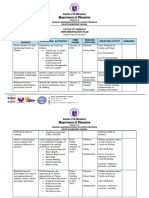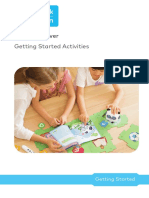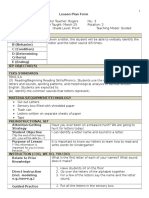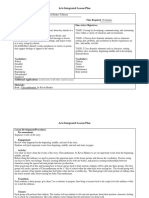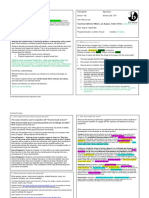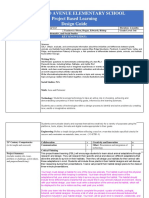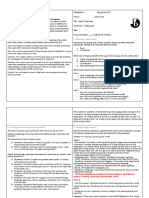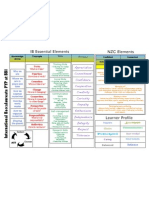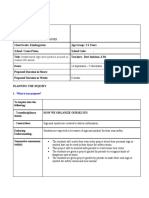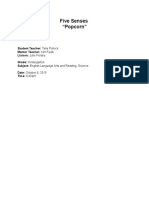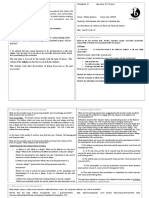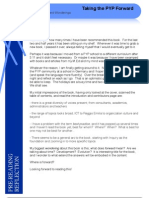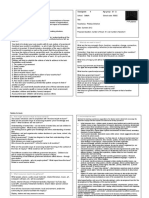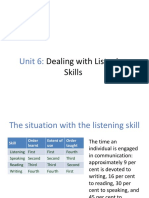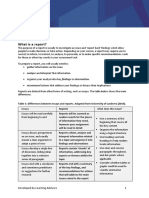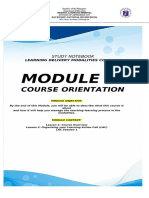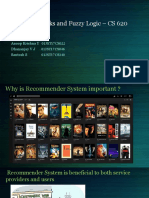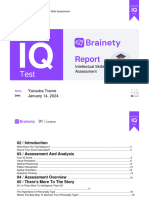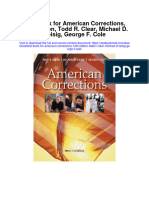Professional Documents
Culture Documents
Isa Parent Letter
Isa Parent Letter
Uploaded by
api-234167117Original Title
Copyright
Available Formats
Share this document
Did you find this document useful?
Is this content inappropriate?
Report this DocumentCopyright:
Available Formats
Isa Parent Letter
Isa Parent Letter
Uploaded by
api-234167117Copyright:
Available Formats
Busan International Foreign School
50 Gijang-daero, Gijang-eup, Gijang-gun, Busan 619-902 Ph: +82 51 742 3332 Fax; + 82 51 742 3375 Email: [email protected] Website: www.bifskorea.org
Friday, 24 January 2014 Dear Parents/Guardian, As you should be aware students in Grade 3, 4, 5, 6, 7, 8 and 9 will be taking part in The International Schools Assessment (ISA). The tests this year will take place on February 12th and 13th. Below is some information concerning this test that you may find useful. The Introduction of The International Schools Assessment at Busan International Foreign School One of the most important questions for parents is always, How is my child doing? A related question is Compared to what? This is a particularly critical question for families away from home, where it is hard to know how systems, and standards, compare. Until recently it has been difficult for any international school to answer these questions in a really substantial way, because the international school network has not had access to a form of external assessment normed on international standards. This changed, with the development of The International Schools Assessment (ISA). What is ISA? International Schools Assessment (ISA) is an annual assessment programme that has been specially developed to measure skills in mathematical literacy, reading and writing of students in international schools. ISA is based on the internationally endorsed reading and mathematical literacy frameworks of the Programme for International Student Assessment (PISA) developed by the Organization for Economic Cooperation and Development. It is designed and developed in Australia by the Australian Council for Educational Research (ACER). The ISA reports provide descriptive information about what students know and can do. The results are equated from year to year so they can be used to track changes over time at individual and school level. What is ISA NOT? ISA is not a competitive or comparative test, such as the IB Diploma or AP. It is not a test that students pass. It will not be used for purposes other than providing data to us, you, and your child, about his/her learning. While we give opportunities for practice, students do not prepare for the tests, since they are consistent with what students learn on a regular basis.
Who uses ISA? A growing number of international schools now use ISA, including many of the acknowledged world leaders in international education. How do the assessments work? Students complete a reading literacy test, a mathematical literacy test and two writing tests, each of which takes between 45 minutes and one hour to administer. The tests include both multiple-choice and open-ended tasks. The tests will be taken on February 12th and 13th. They will be taken in normal school conditions e.g. in homeroom groups, in conditions that are familiar to our students. How will BIFS use the results? As a school, we will analyse all data about the general patterns of performance and use these as another of the ways in which we monitor and modify our educational programme. These data will be one of the success indicators to which we pay attention each year. What information will I receive as a parent? We will pass on all information about your child to you in the form of an individual report. These reports are provided by ACER and are very comprehensive. They will give you a detailed record of your childs performance in relation to scales that describe increasingly advanced skills in mathematical literacy, reading literacy and writing. You will receive them by the end of May. It is entirely your decision as to whether you pass on this information to another school when you leave BIFS. In ConclusionIf you have any questions about the introduction of ISA at BIFS, please feel free to contact me directly. You may also wish to visit the websites of PISA (www.pisa.oecd.org) and/or ACER (www.acer.edu.au), for further information. Jeff Blackband Exams Coordinator
You might also like
- Hands-On Social Studies for Ontario, Grade 1: An Inquiry ApproachFrom EverandHands-On Social Studies for Ontario, Grade 1: An Inquiry ApproachNo ratings yet
- CUF Implementation-Plan Sicat-ESDocument3 pagesCUF Implementation-Plan Sicat-ESCid PonienteNo ratings yet
- 3.MTiny Discover Getting Started ActivitiesDocument58 pages3.MTiny Discover Getting Started ActivitiesLegado OnlineNo ratings yet
- Commitment OPCRF SY 2022-23Document10 pagesCommitment OPCRF SY 2022-23Ginadine L Balagso100% (6)
- 2011-2012 PYP PlannerDocument4 pages2011-2012 PYP Plannertyas24100% (2)
- Lesson Plan Template: GCU College of EducationDocument13 pagesLesson Plan Template: GCU College of Educationapi-321260411No ratings yet
- How The World Works-Pyp 3Document3 pagesHow The World Works-Pyp 3api-253737767No ratings yet
- 4th - How We Express OurselvesDocument10 pages4th - How We Express OurselvesdanijelapjNo ratings yet
- Sample1.1 - en P or Y1Document4 pagesSample1.1 - en P or Y1Elena BajanNo ratings yet
- Planning A Maths WeekDocument13 pagesPlanning A Maths WeekNur Izzah SautiNo ratings yet
- Progressive Education In Nepal: The Community Is the CurriculumFrom EverandProgressive Education In Nepal: The Community Is the CurriculumNo ratings yet
- Lesson Plan Burried LettersDocument2 pagesLesson Plan Burried Lettersapi-3076701360% (1)
- Arts Integration Lesson Chrysanthemum TableauDocument4 pagesArts Integration Lesson Chrysanthemum Tableauapi-350363477No ratings yet
- Signs and Symbols Scavenger Hunt: Learning ObjectivesDocument4 pagesSigns and Symbols Scavenger Hunt: Learning ObjectivesKathleen MoradaNo ratings yet
- To Inquire Into The Following: Transdisciplinary Theme Who We AreDocument4 pagesTo Inquire Into The Following: Transdisciplinary Theme Who We AreAnonymous CwTZJKtNo ratings yet
- How We Organize Ourselves Parent Letter 2011Document2 pagesHow We Organize Ourselves Parent Letter 2011eokuceraNo ratings yet
- k1 Wwa Planner 9 SepDocument4 pagesk1 Wwa Planner 9 SepZoha Hassan100% (1)
- How We Express OurselvesDocument12 pagesHow We Express Ourselveskangan jainNo ratings yet
- How We Organize Ourselves: 1. What Is Our Purpose?Document6 pagesHow We Organize Ourselves: 1. What Is Our Purpose?rana100% (1)
- How We Organize OurselvesDocument4 pagesHow We Organize Ourselvesapi-250808296No ratings yet
- How The World WorksDocument2 pagesHow The World WorksMariana SuarezNo ratings yet
- Unit 4 Planner - Grade 3Document9 pagesUnit 4 Planner - Grade 3Siba ShekharNo ratings yet
- IB Unit Planner Who We Are With Assessment PDFDocument6 pagesIB Unit Planner Who We Are With Assessment PDFsugunaNo ratings yet
- Unit 1-3rd Grade 2018-2019 PBL TemplateDocument7 pagesUnit 1-3rd Grade 2018-2019 PBL Templateapi-438888114No ratings yet
- Socials - 00 - Ngo Unit PlanDocument4 pagesSocials - 00 - Ngo Unit Planapi-526315392No ratings yet
- Math UnitDocument9 pagesMath Unitapi-277053076No ratings yet
- Howweexpressourselves 1Document7 pagesHowweexpressourselves 1api-253525825100% (1)
- Hweo Artists Pyp PlannerDocument1 pageHweo Artists Pyp PlannerMohammad IdreesiNo ratings yet
- PYP 6 Who We Are NewsletterDocument3 pagesPYP 6 Who We Are NewsletteryanyuliusNo ratings yet
- How We Express Ourselves NewsletterDocument2 pagesHow We Express Ourselves NewsletterNISTYear1No ratings yet
- PYP-POI - Prep-1 - Grade5Document6 pagesPYP-POI - Prep-1 - Grade5kangan jain100% (1)
- PYP III Daily Lesson Planner Friday 2Document3 pagesPYP III Daily Lesson Planner Friday 2Sundas Ansari100% (1)
- Sarah Fitzpatrick ResumeDocument2 pagesSarah Fitzpatrick Resumeapi-338159578No ratings yet
- 4th Grade Reflection For Sharing The PlanetDocument3 pages4th Grade Reflection For Sharing The PlanetKristin CramerNo ratings yet
- 2 - How We Express Ourselves StorytellingDocument2 pages2 - How We Express Ourselves StorytellingMariam BazerbachiNo ratings yet
- To Inquire Into The Following: Transdisciplinary Theme: 1. What Is Our Purpose?Document4 pagesTo Inquire Into The Following: Transdisciplinary Theme: 1. What Is Our Purpose?Zaara ZaveriNo ratings yet
- IB Overview - BBI SpecificDocument1 pageIB Overview - BBI SpecificIanNo ratings yet
- CommunitiesDocument6 pagesCommunitiesapi-192781530No ratings yet
- V2 Summary of PYP Framework - Enhanced ModelDocument1 pageV2 Summary of PYP Framework - Enhanced ModelAnnie A ShahNo ratings yet
- How We Express Ourselves - Landscape at NightDocument4 pagesHow We Express Ourselves - Landscape at NightReham0% (1)
- How We Organise Ourselves NewsletterDocument1 pageHow We Organise Ourselves Newsletternisty2No ratings yet
- Final How The World Works 2nd GradeDocument1 pageFinal How The World Works 2nd Gradeapi-262886818No ratings yet
- Grade 3 - Planning-Sharing-The-Planet-Grade-3-4 PDFDocument4 pagesGrade 3 - Planning-Sharing-The-Planet-Grade-3-4 PDFManisha BhavsarNo ratings yet
- 2011 2012 Planner How The World Works 2011 2012 Kindergarten 2Document4 pages2011 2012 Planner How The World Works 2011 2012 Kindergarten 2Donche RisteskaNo ratings yet
- How We Express Ourselves RevisedDocument1 pageHow We Express Ourselves RevisedMariana SuarezNo ratings yet
- Summative Assessment 2015-16 Ad RubricDocument2 pagesSummative Assessment 2015-16 Ad Rubricapi-353859154100% (1)
- GR 4 How We Organize OurselvesDocument4 pagesGR 4 How We Organize OurselvesGEETHA NARAYANAN HOMEROOM - PRIMARY-SLM-MAIN100% (1)
- Central Idea: Understanding How We Share The Planet Empowers Us To Take Action With The Future in MindDocument1 pageCentral Idea: Understanding How We Share The Planet Empowers Us To Take Action With The Future in MindMariana SuarezNo ratings yet
- PYP Grade 1 - Handbook 2019-20 PDFDocument16 pagesPYP Grade 1 - Handbook 2019-20 PDFSatish Kumar ChennuNo ratings yet
- Uoi 3 Parent LetterDocument7 pagesUoi 3 Parent Letterapi-265511182No ratings yet
- DesignDocument5 pagesDesignapi-418711725100% (1)
- How We Organize Ourselves Unit LetterDocument1 pageHow We Organize Ourselves Unit LetterMariana SuarezNo ratings yet
- Unit 1 Weebly How The World WorksDocument1 pageUnit 1 Weebly How The World Worksapi-326996466No ratings yet
- Pyp How We Organize Our SelvesDocument6 pagesPyp How We Organize Our SelvesInaNo ratings yet
- School Almanac 2018-19 PDFDocument93 pagesSchool Almanac 2018-19 PDFAtulya Bhaskar100% (1)
- ICT Unit Planner - Year 3 Sharing The PlanetDocument1 pageICT Unit Planner - Year 3 Sharing The Planetdanny67% (3)
- Five Senses PopcornDocument10 pagesFive Senses Popcornapi-315905127No ratings yet
- Planning The Inquiry: TH THDocument5 pagesPlanning The Inquiry: TH THPushpita NandyNo ratings yet
- 9 Stage Planner Gr4 How We Organise OurselvesDocument4 pages9 Stage Planner Gr4 How We Organise OurselvesRaj Kumar MNo ratings yet
- Pyp 5 Unit 3 NewsletterDocument4 pagesPyp 5 Unit 3 Newsletterapi-516787540100% (1)
- Taking The PYP Forward, Reflections and WonderingsDocument23 pagesTaking The PYP Forward, Reflections and WonderingsC DwyerNo ratings yet
- Government Y6 PYP Planner Summer 1 2012Document4 pagesGovernment Y6 PYP Planner Summer 1 2012GEETHA NARAYANAN HOMEROOM - PRIMARY-SLM-MAINNo ratings yet
- Pyp c3 Play Based LearningDocument78 pagesPyp c3 Play Based Learningpinar demirelNo ratings yet
- Yearbook Cover PosterDocument1 pageYearbook Cover Posterapi-234167117No ratings yet
- Exhibition Timetable 2013-14Document1 pageExhibition Timetable 2013-14api-234167117No ratings yet
- PartyDocument1 pagePartyapi-234167117No ratings yet
- Isa 3456Document1 pageIsa 3456api-234167117No ratings yet
- Xcountry Map 2013-14Document2 pagesXcountry Map 2013-14api-234167117No ratings yet
- Camp Letter With Letterhead 2013-2014Document3 pagesCamp Letter With Letterhead 2013-2014api-234167117No ratings yet
- Bifs PPT Introduction For BlogDocument7 pagesBifs PPT Introduction For Blogapi-234167117No ratings yet
- Kesya Nursyahada - 21081010120 - Monthly Report Learning Progress 3&4Document9 pagesKesya Nursyahada - 21081010120 - Monthly Report Learning Progress 3&421081010120 KESYA NURSYAHADANo ratings yet
- EAPP-Week 12Document3 pagesEAPP-Week 12rose suarezNo ratings yet
- Episode 8 CLOSE ENCOUNTER WITH THE SCHOOL CURRICULUMDocument13 pagesEpisode 8 CLOSE ENCOUNTER WITH THE SCHOOL CURRICULUMAnna MANGUBATNo ratings yet
- Unit 6:: Dealing With Listening SkillsDocument56 pagesUnit 6:: Dealing With Listening SkillsOtillier011No ratings yet
- April 22, 2024Document3 pagesApril 22, 2024cindy dizonNo ratings yet
- Principle and Methods of Teaching AccountingDocument3 pagesPrinciple and Methods of Teaching AccountingRAIN ALCANTARA ABUGANNo ratings yet
- Reports: What Is A Report?Document3 pagesReports: What Is A Report?johnNo ratings yet
- Written Assignment 1Document2 pagesWritten Assignment 1NarayanNo ratings yet
- Curriculum Management StrategyDocument36 pagesCurriculum Management StrategyBheki TshimedziNo ratings yet
- Ama Basic Education Las PinasDocument2 pagesAma Basic Education Las PinasAlex Abonales DumandanNo ratings yet
- Baruch BulletinDocument345 pagesBaruch BulletinMing JiangNo ratings yet
- Format Internship I YearDocument7 pagesFormat Internship I YearTanishq RathoreNo ratings yet
- Brown Teaching PhilosophyDocument2 pagesBrown Teaching Philosophyapi-481748566No ratings yet
- Study Note Book IsmaelDocument45 pagesStudy Note Book IsmaelNur ShaNo ratings yet
- Movi3 Recommender SystemDocument15 pagesMovi3 Recommender SystemDhananjay JahagirdarNo ratings yet
- 4-Yr High School Course PlanDocument3 pages4-Yr High School Course PlanjlgrandalenNo ratings yet
- Welcome LetterDocument1 pageWelcome Letterapi-275378235No ratings yet
- AnalysisDocument19 pagesAnalysisyacoubaNo ratings yet
- Unit-03 Animals PDFDocument306 pagesUnit-03 Animals PDFsuja robinNo ratings yet
- Test Bank For American Corrections 12th Edition Todd R Clear Michael D Reisig George F ColeDocument26 pagesTest Bank For American Corrections 12th Edition Todd R Clear Michael D Reisig George F Colecaradocbridget61rdNo ratings yet
- Clipped WordsDocument3 pagesClipped WordsLanilee IntaligandoNo ratings yet
- LS 5 Understanding The Self and SocietyDocument68 pagesLS 5 Understanding The Self and SocietyEvan Maagad LutchaNo ratings yet
- Dumalneg National High School: Horticulture Darell James B. Cariaga 1 Grade 7 2020 - 2021Document4 pagesDumalneg National High School: Horticulture Darell James B. Cariaga 1 Grade 7 2020 - 2021My TeacherNo ratings yet
- Module 2 Principles and Theories of Language Acquisition and LearningDocument8 pagesModule 2 Principles and Theories of Language Acquisition and LearningFretchin Mae CocaNo ratings yet
- Minit Curai Bengkel Differentiation2019Document2 pagesMinit Curai Bengkel Differentiation2019Charlynn ChooNo ratings yet
- Pe Coursework A2Document7 pagesPe Coursework A2afiwhhioa100% (2)

